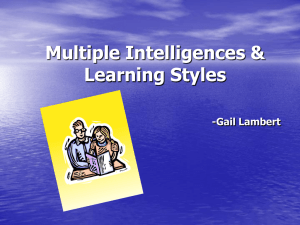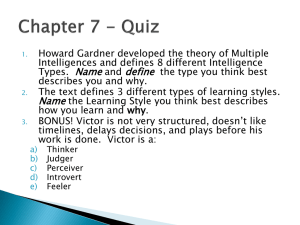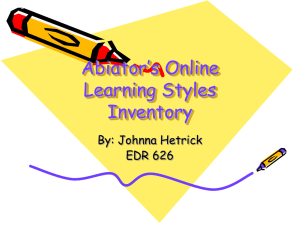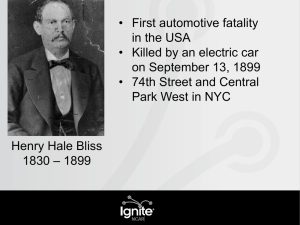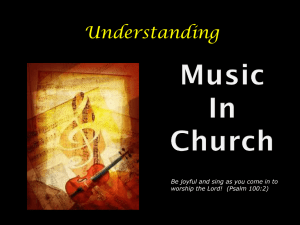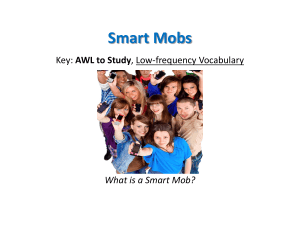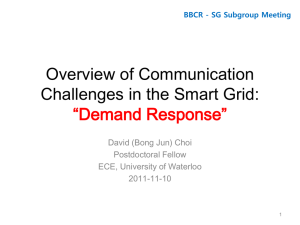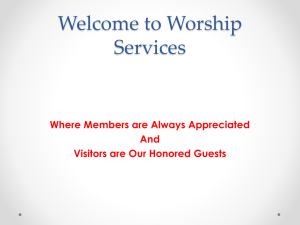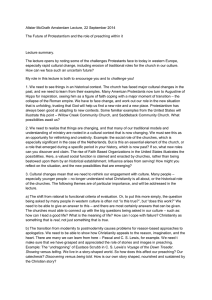Christian Education Purpose and Goals Workshop
advertisement
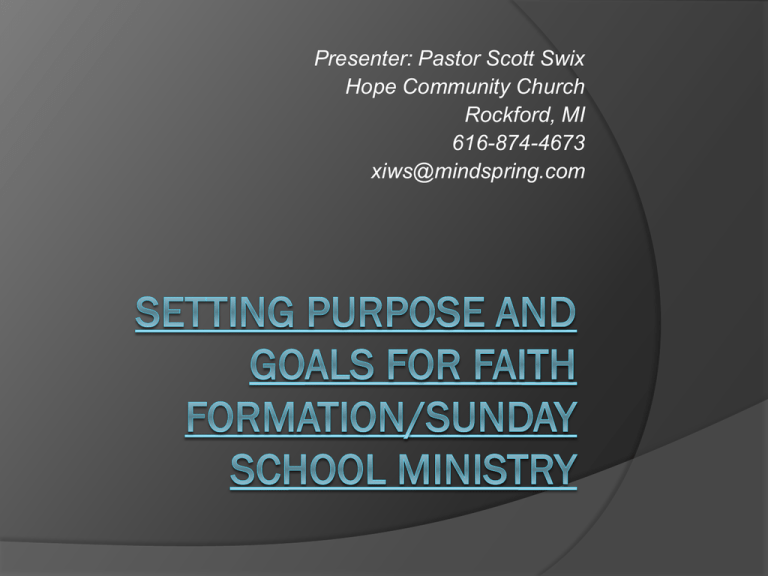
Presenter: Pastor Scott Swix Hope Community Church Rockford, MI 616-874-4673 xiws@mindspring.com Why and What Why are we here today? To help you better identify where you are trying to go with your Christian Education ministry, why that is important to you, and how you can make progress. So what’s my goal? That at the end of this session you will feel you have some new practical and useful ideas and resources to help improve your overall Christian Education ministry for all ages, not just Children. How? What are we going to cover? I’m going to TRY and cover, very quickly, the following Purpose & Mission, Priorities, Goals Some Teaching and Learning Considerations Curriculum Considerations We might not be able to get to all of these. That is one of our challenges! Let’s Get Started…. A couple of quick and easy questions… 1, 2 and 3 A somewhat more complicated, convoluted and perhaps confusing set of questions – but they are all “yes” or “no” 1,2,3,4,5,6,7 Purpose, Mission and Goals (and Priorities) Level 1 - Purpose : Why are we here? Level 2 - Mission : What are we trying to do? Level 3 - Goals : Something you could check off and say “Done!” Matthew 28 Great Commission: Is it Purpose or Mission? Priorities? The list of what is most important about something. Sorry, not everything can’t be “high” – you have to choose! PURPOSE Big, conceptual, high level Purpose of “The Church” From the ELCA Constitution “The Church is a people created by God in Christ, empowered by the Holy Spirit, called and sent to bear witness to God’s creative, redeeming, and sanctifying activity in the world.” From “The Purpose Driven Church” by Rick Warren Outreach, Worship, Fellowship, Discipleship, Service Purpose of “Christian Education”? Colossians 1:27-28 Matthew 28:19-20 They both sort of say “Go and teach and make disciples!” GREAT! Now what? Mission Deciding what we really want, what we are trying to accomplish, is extremely important! An example… ? Any “Purpose” or “Mission” statements for your Christian Education ministries? An exercise to do together… Goal Setting 101 Fuzzy good things vs nice specific goals SMART Goals Specific - Very clear. Not Fuzzy. Measurable - A Yes, a No, a number, something concrete Achievable - “world peace through Christ” does not count. Relevant - If it’s not relevant, people won’t care, and it’s not worth the effort Timed - Tomorrow, next week, next month, by end-of-year. Something like that. You can clearly share, work toward and track progress for SMART goals. Goals: Keep your context in mind Who is in the congregation? Who is in the community? What is achievable by them and relevant to them? Important Factors include (but are not limited to) Education levels, literacy, special needs Family and neighborhood stability Ages Financial resources (families and congregation) Availability of Time Experience of students Leadership skills, experience and other resources Learning Styles and Multiple Intelligences Learning styles (from “Learning Styles” by Marlene Lefever) Imaginative - Why do I need to know this? Analytic - What do I need to know? Common Sense - How does this work? Dynamic - What can this become? Learning Styles and Multiple Intelligences Multiple intelligences 8 different ways to “be smart” Word Smart - verbal presentation, reading, writing, storytelling, etc. Number Smart - problem solving, puzzles, charts & graphs, etc. Picture Smart - photos and video, maps, diagrams, mixed media Body Smart - games, puppets, movement, manipulatives, etc. Music Smart - rhythm, music, singing, etc. People Smart - discussion, role playing, peer coaching, etc. Self Smart - independent study, journal, meditation, self-paced instruction, etc. Nature Smart - field trips, experiments, analogies with nature, Learning Styles and Multiple Intelligences Six “Types” of Adult Audiences (Shelly Ely Pearson) Fellowship – informal discussions with topics relevant to today – relationships are valued Traditionalists – Bible oriented; lecture-style; specific curriculum to follow Neo-traditionalists – “returnees” in search; looking for a mentor; influenced by culture Study – want faith & life application; see teacher as co-learner Social Action – faith is private; view church as a launching place for action Multiple interest – combination of several of the above So…. What to do with LS, MI and AA types? 1. Realize that both students and teacher/leaders belong to these different categories. 2. Help teacher/leaders understand their own style preference and adjust for it 3. Ensure curriculum evaluation includes considering learning styles 4. Acknowledge you can’t do everything all the time – but you can mix it up Curriculum – Not Just Products! 1) Overall scale and scope of education/formation classes and experiences offered 2) Format of how material is presented 3) Scheduling of classes and experiences 4) Specific products for each age group, topic, etc How well will a particular curriculum product help you fulfill your purpose, mission and goals? Curriculum Scale and Scope I don’t have one answer - but I do have an example. It may be helpful. Faith Formation at Hope Community Church Curriculum “Format” A very quick slide. I suspect you already know about all of these… “Traditional” age-group, room based (e.g. Augsburg Akaloo) Lectionary (e.g. Augsburg Spark) Intergenerational Rotational (e.g. Augsburg Spark Rotation) Home and Family Faith Formation/Curriculum Scheduling Perhaps more important than we might think… Questions to ponder… (but not answer here today) What is the best “scheduling” of “classes” for your congregation? How long do you really need for each session? How much preparation is required, how often? Scheduling Examples – and some thoughts on them Weekly 40 minutes really short between services… Weekly a bit longer 60 minutes before or after worship Bi-weekly Extended 75-90 minutes MidWeek Curriculum - Specific Products There are lots. I’ll make no recommendations here, other than evaluate them based on all the other factors to see what is best for you. But start with “what do you need, for what you are trying to accomplish?” and then work your way down to “what is the product that will fulfill that need?” Curriculum Product Evaluation Lots of ways to do it. Lots ideas in the References and Resources. It is best done as a team. It should be matched up to congregation and/or Christian Education purpose and mission It should look at a WIDE range of factors A couple of real-life experiences… Adult vs Children/Youth Curriculums Children’s curriculum products are probably easier to choose than those for adults – children’s curriculums are usually designed for multi-year and wide coverage Adult curriculum products are usually limited in the number of sessions and focused on particular topic or theme. Adult Curriclum Considerations Ten Top Interests of Adults* (Eugene Roehlkepartain, though a bit dated ~1990) 77% The Bible 75% Developing a personal relationship with Jesus 74% Improving skills at showing love and concern 74% Learning how to be a good spouse, partner or parent 73% Applying my faith to daily living 69% Making more friends at church 62% Learning how Christians make moral decisions 62% Getting help with my spiritual journey 62% Having greater sense of community at church 59% Helping members who are experiencing hardship Adults may also have “learned” how to sit and listen and participate in one “format” of study and learning, or only exploring one area of faith (“Bible Study”) - but that doesn’t mean that they particularly like it, and may be less inclined to engage and participate and even continue. Adult Faith Formation at Hope Community Church Adults are a lot like kids Learning styles & multiple intelligences A desire to have fun – most of my adults love the JrHi curriculum! Quiz bowl – answer questions, win treats! A WIDE range of topics, covering the entire scope and interest EXAMPLE: Curriculum Topics for Hope Community Church Challenges I suspect that we didn’t get to this topic. But if we do… What is the greatest challenge your congregation faces in providing Christian Education and Formation for your congregation? Leader/teachers - # volunteers, Time for preparation, Time for equipping, Level of experience Financial - budget for curriculum, supplies, leader training, Space - number of rooms, number of students, age distributions Time - how often to meet, how long (different groups, different goals, different time needs), all groups/classes at the same time or different times, “one trip to church” or multiple, scheduling with worship (Hope’s solutions over time) Participation - low or erratic ??? Thank You Very Much! May the Lord bless you and YOUR ministry
